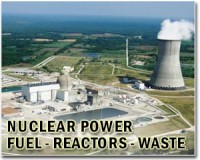 |
Paris (AFP) Nov 2, 2009 Nuclear regulators in France, Britain and Finland said Monday they have told French nuclear giant Areva and its foreign partners to correct a safety design flaw on its latest-generation EPR reactor. Any redesign could increase already costly delays in completing the first two of the reactors being built by Areva in France and Finland, and undermine French attempts to create a massive export market for its technology. EPR reactors are currently being built in Finland, France and China and the certification process is underway in the United States, Areva said. Launched in 1992, the European Pressurised Reactor was designed by French power giant EDF and German counterparts EON and RWE to be safer, more fuel efficient and generate less nuclear waste. But the regulators said control systems used to operate the EPR reactor in normal conditions are too closely interconnected with the safety systems that would take over under extraordinary circumstances. "Independence is important because, if a safety system provides protection against the failure of a control system, then they should not fail together," they said in a joint statement. "The UK nuclear safety regulator HSE, the French nuclear regulator ASN and the Finnish nuclear regulator STUK, have asked the licensee and manufacturer to make improvements to the initial EPR design," they said. "The licensees, and Areva, have agreed to make architectural changes to the initial EPR design which will be reviewed by the regulators. It is for the licensees and the manufacturer, Areva, to respond to its regulator's issues." A spokesman for Areva told AFP the regulator's request "does not call into question the safety of the reactor." Areva "supports the common efforts of the nuclear safety authorities that aim to standardise control and instrumentation systems," he added. But in a letter to EDF's head of nuclear engineering, the head of the French regulator Jean-Christophe Niel said there was "no certainty it will be possible to prove an acceptable level of safety based on the current architecture." He asked EDF to "examine straight away proposals for an alternative design." President Nicolas Sarkozy has made the EPR a centrepiece of his campaign to promote France's nuclear know-how around the world, and has green-lighted the construction of a second reactor in France. In recent months, he has aggressively promoted sales of French nuclear reactors abroad and holds up France's current network of 58 reactors as one of the safest and cleanest in the world. But the world's first EPR, built by a consortium led by Areva and Germany's Siemens for the Finnish power group TVO and set to come online in 2009, is over three years behind schedule. France's first EPR reactor, under construction in Flamanville, is due to go into service in 2012. EDF, which last year acquired British nuclear power provider British Energy, also plans to build four EPR reactors in Britain. Areva and EDF are also to build two EPR reactors in Taishan in southern China, while Areva has signed a draft accord to provide up to six reactors to India, a huge market thrown open by the end of a nuclear trade embargo. The US state of Maryland last week approved a plan for EDF to take a stake in Constellation Energy Group, clearing the final hurdle to build four EPR reactors in the United States.
Share This Article With Planet Earth
Related Links Nuclear Power News - Nuclear Science, Nuclear Technology Powering The World in the 21st Century at Energy-Daily.com
 Iran wants review of nuclear fuel deal
Iran wants review of nuclear fuel dealTehran (AFP) Nov 2, 2009 Iran said on Monday it wants a review of the UN-brokered nuclear fuel deal, indicating it prefers to purchase the supplies directly rather than sending its own uranium abroad. Tehran's latest stance on the high-profile proposal came as close ally Moscow and London urged the Islamic republic to accept the offer which aims at applying the brakes on Iran's galloping nuclear programme. ... read more |
|
| The content herein, unless otherwise known to be public domain, are Copyright 1995-2009 - SpaceDaily. AFP and UPI Wire Stories are copyright Agence France-Presse and United Press International. ESA Portal Reports are copyright European Space Agency. All NASA sourced material is public domain. Additional copyrights may apply in whole or part to other bona fide parties. Advertising does not imply endorsement,agreement or approval of any opinions, statements or information provided by SpaceDaily on any Web page published or hosted by SpaceDaily. Privacy Statement |